Marketing operations leaders are Modern Orchestrators, Psychologists, and Scientists (MOps)
This 4-part series presents a framework that helps rationalize the roles and responsibilities modern marketing operations leaders are taking on. This installment summarizes the framework briefly, and dives into how MOps leaders are now “orchestrators.”
In case you missed it, part 1 is here.
Inspiration for this framework
Two years ago, marketing technology pioneer and chiefmartec.com editor Scott Brinker outlined the four key responsibilities of marketing technologists, summarized here.
That work espoused the view that you could be both a marketer AND a technology leader. They are not mutually exclusive! It was my inspiration for this framework, explaining how today’s MOps leaders are instrumental for marketing and business success.
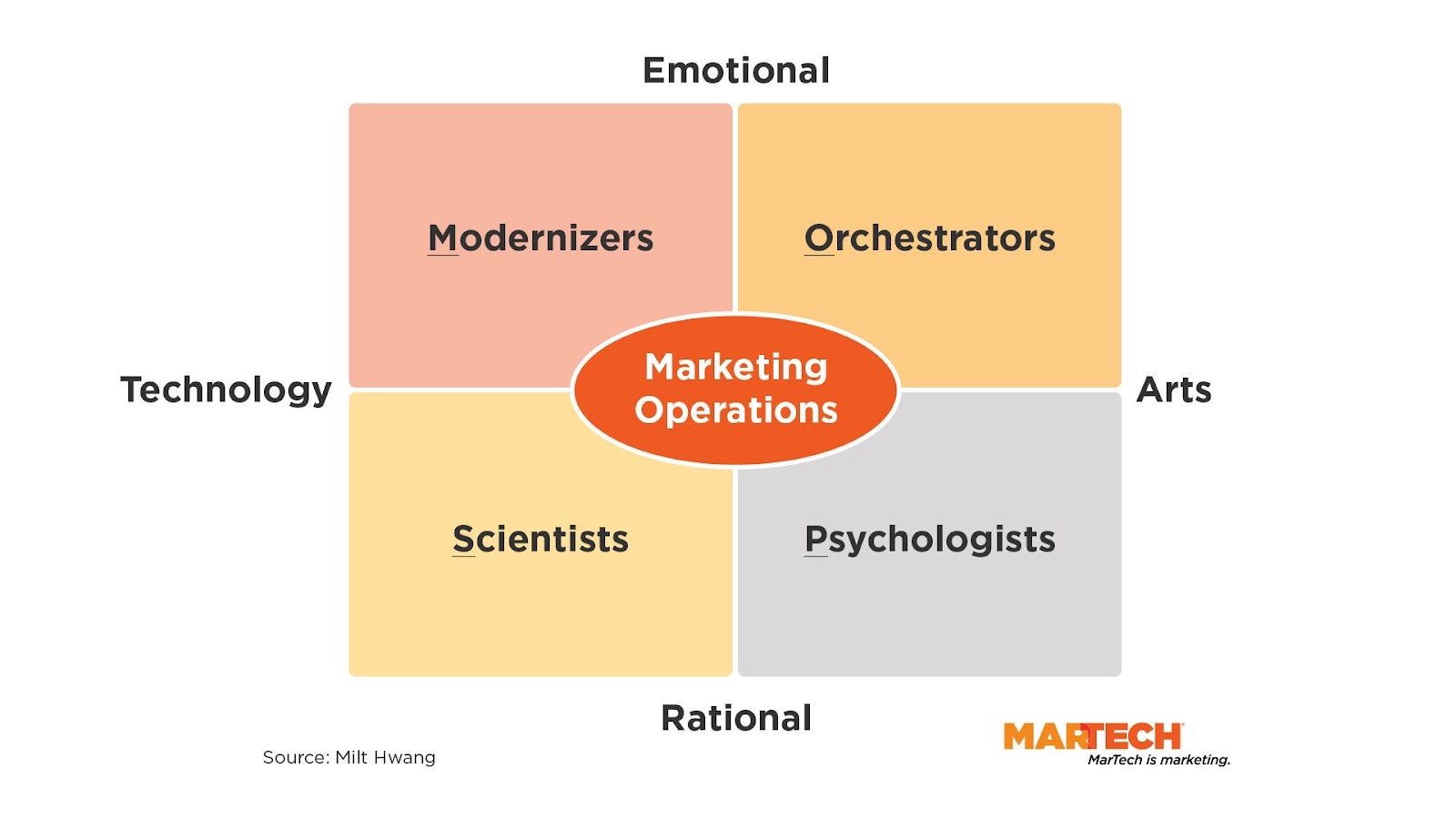
X-Axis: A range of skills from a focus on technology to creativity and arts
Y-Axis: A range of decision-making skills, ranging from emotional to rational approaches
The resulting grid captures four MOps archetypes or “personas.” MOps leaders exhibit characteristics across all parts of this framework and will operate in multiple quadrants, similar to Brinker’s frameworks.
Modernizers – Are most likely to be the “original” technologists, constantly modernizing their martech stack.
Orchestrators – Are the closest to Brinker’s Maestros and the focus of this article. He described this archetype in 2020 as the “Operations Orchestrator — MAESTROS who design and manage the workflows, rules, reports, and tech stacks that run the marketing department.
Psychologists – Are now increasingly responsible for “reading customers’ minds,” i.e. interpreting customers’ interest through intent data and digital engagement.
Scientists – Are constantly testing and evaluating. Experimentation is their specialty.
Orchestrators: Leaders of the band
Now that you’re familiar with the framework, let’s dig deeper into the Orchestrators!
I’ll start with a personal story. My exposure to orchestration started with 8-straight years of practice in violin and trumpet during my formative years. Each week was literally a blur of private lessons, group lessons, orchestra and/or band practice. I probably spent as much time with music directors as I did with my family.
It was painfully obvious to those conductors when we hadn’t prepared or practiced. Moreso, we would get – literally – an “earful” from the conductor when we were not listening to the other instrument sections. If we were not coordinating our efforts and timing, the outcome was awful for anyone listening.

This orchestration metaphor is powerful because there are multiple levels for MOps leaders:
- As a project management team within marketing, and often as a conductor across external agency partners.
- As a cross-function business partner and primary contact for IT, compliance, and legal, in addition to the traditional MOps role of achieving marketing/sales alignment
Notably, all marketers have to be project managers for their own tasks/deadlines. They must be aligned with overall campaign and program timelines.
However, as organizations scale they are more likely to have dedicated project management teams to handle coordination across the specialist teams within marketing. The orchestration responsibility may include timeline, scope, and capacity trade-offs even after campaign briefs have received approval.
The orchestration responsibility multiplies when agency execution teams are delivering on individual tactics and media buys. Last year, Optimizely described these evolving orchestration duties as a “transformative shift and approach towards how marketing synchronizes their teams, content, channels, workflows, and data!”

I believe the shift is even more impactful, with orchestration benefits being felt beyond marketing. The highest value “program orchestration” responsibilities occur when MOps leaders are representing marketing’s interests in enterprise-wide programs with other functions within the organization, including product, compliance, and IT. Examples of orchestration duties with these other key functions can include:
- Product teams – Coordinating campaigns with major product feature/functionality launches, and managing brand standards.
- Legal/Compliance – Overseeing compliance with Can-Spam, GDPR, and CCPA, and customer preference and data privacy initiatives that may be initiated by a marketing touch-point.
- IT/Procurement – Technology stack management, vendor evaluations and negotiations, platform integrations and data management.
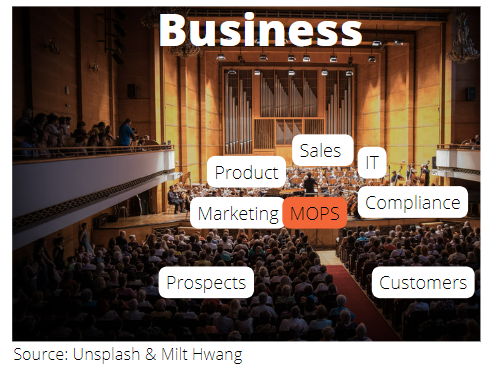
All of this departmental and cross-departmental coordination requires skill sets that can be analogized as the difference between a chamber orchestra (marketing) and a full symphony. It’s the highest level of conducting across the enterprise.
MOps leaders are holding individuals and teams to target timelines while managing the scope of a particular campaign and business initiative. They do this while also overseeing targeting of customer and prospect segments.
In order to accomplish this complex segmentation and coordination, MOps leaders are now responsible for cross-functional data – embodied by the modern martech stack imperative: integration. Integration across systems has been the #1 issue for marketers since the modern marketing tech stack started exploding in the early 2010’s, but software and solutions providers finally listened. A tipping point was reached in 2020. Marketers reported that we were finally working within an integrated, multi-system environment, according to a CDP Institute member survey analyzed here.
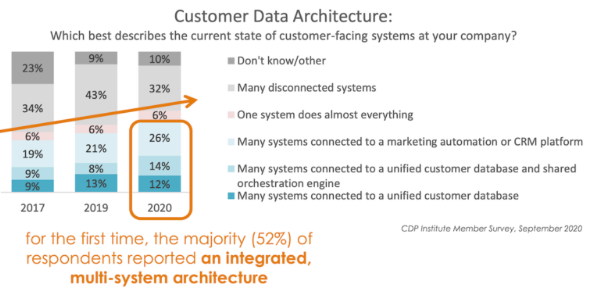
Continuing with the orchestration analogy, the conductor is the integration “synchronizer,” deciding if/when the data flows across the stack. The sheet music is the data model standard showing how to map common attributes.
However, just because we now have this more integrated environment does not mean our work is done. The instruments do not play themselves (yet!) and they require configuration and deliberate training to play effectively — both individually and in groups.
Training was one of the top responsibilities for marketing ops leadership, ranking it in the top 5 of MOPS tasks by percentage of work, according to the 2022 MarTech Salary and Career Survey, published jointly by MarTech and chiefmartec.com (free, ungated download here). conducted by chiefmartec.

In the 2020 version of that same study, training was highlighted as one of the top two responsibilities for many of the primary marketing technologists personas, and 91% of operations orchestrators reported that training and supporting technologies were among their top priorities.
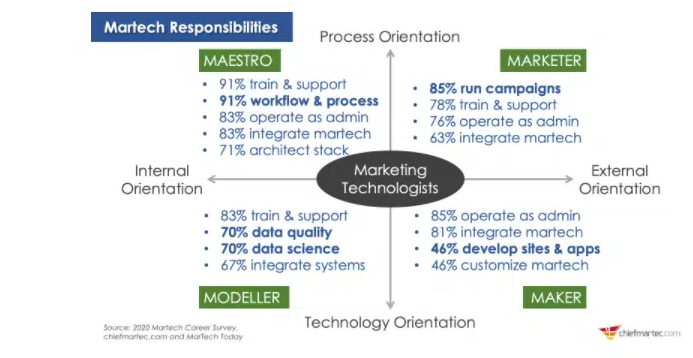
MOps leaders are never done
Finally, under the category of “MOps leaders are never done”, the last several years have also forced a whole new category of orchestration duties – a combination of conducting, training, and martech growth: marketing work management.
The largest growth (67%) over the last several years was in the category of “work management”, according to the 2022 edition of the Martech Landscape. Established entrants such as Adobe expanded with the acquisition of Workfront, while newer players like Trello and Monday gained traction.
Although this was already a prevailing trend BEFORE the pandemic, the hybrid/remote work environment brought on by the last 2+ years forced these project management and agile-planning tools to the forefront. The marketing work management category grew to over 1000+ tools, according to the State of Martech 2022.
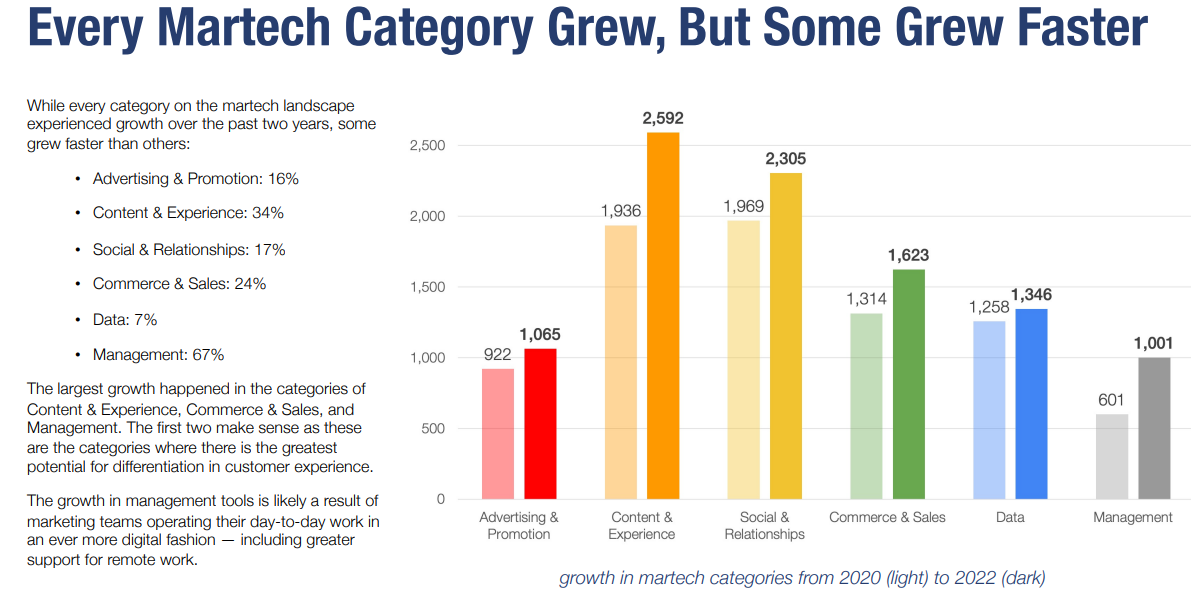
Source: State of MarTech 2022 – chiefmartec.com and Martech Tribe
MOps leaders are Maestros
In summary, modern MOps leaders are indeed Maestros. They are skilled orchestrators, conducting a symphony across multiple levels. They lead:
- Omni-channel campaigns within marketing and across business functions
- Integration across an ever-growing, integrated martech stack
- Training and deployment as one of their primary responsibilities
Editor’s note: In Part 3 of this 4-part series, Milt will expand on MOps leaders’ growing role as Psychologists. For background on this framework, see Part 1 of this series here.
The post Orchestrators: the second key persona for modern marketing operations leaders appeared first on MarTech.
(25)







